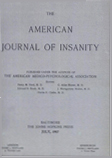VERBALIZATION AND LANGUAGE SYMBOLS IN PERSONALITY ADJUSTMENT
Abstract
From the foregoing account it can be readily seen that language is the chief aid to personality adjustment. The overt non-verbal adjustmental reactions which allow an infant and young child to relate himself to others are replaced to a large extent by linguistic activity. In various neurotic and psychotic disorders a skilled observer may be able to detect personality disturbances long before they may show themselves by distortions of overt activity. Difficulties arise, however, in the attempt to make diagnoses from observations of language alone because the verbal responses may not give a true picture of the individual's personality. This is especially true of the psychoses because even an accurate account of the mental content may not be sufficient for a definition of the personality disorder.
Access content
To read the fulltext, please use one of the options below to sign in or purchase access.- Personal login
- Institutional Login
- Sign in via OpenAthens
- Register for access
-
Please login/register if you wish to pair your device and check access availability.
Not a subscriber?
PsychiatryOnline subscription options offer access to the DSM-5 library, books, journals, CME, and patient resources. This all-in-one virtual library provides psychiatrists and mental health professionals with key resources for diagnosis, treatment, research, and professional development.
Need more help? PsychiatryOnline Customer Service may be reached by emailing [email protected] or by calling 800-368-5777 (in the U.S.) or 703-907-7322 (outside the U.S.).



